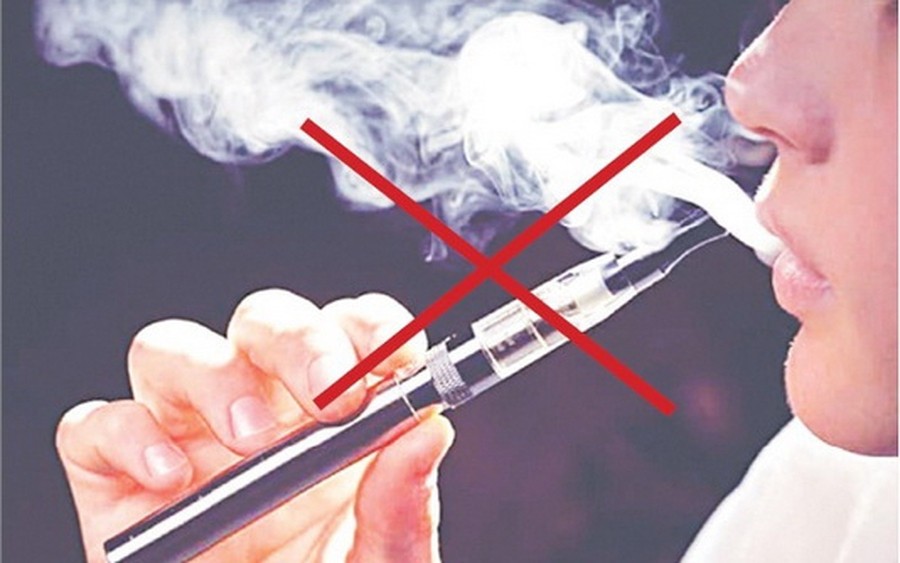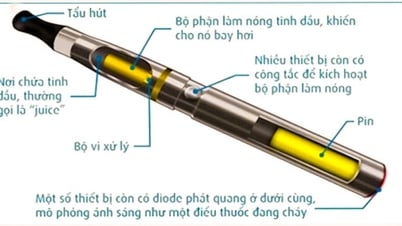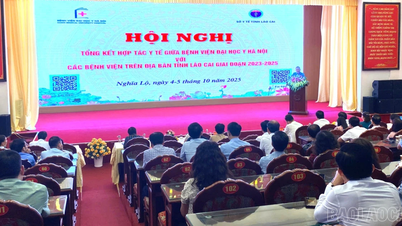E-cigarettes are marketed as a 'safer' alternative, making users think they are 'less harmful' than tobacco products. However, this is not the case.
 |
| Besides the same harmful effects as regular cigarettes, e-cigarettes and heated tobacco products also pose many potential health risks and cause social evils, especially the use of drugs and other addictive substances. |
Electronic cigarettes (ENDs) are battery-powered devices that heat an e-liquid to produce an aerosol/smoke that the user inhales, containing flavorings dissolved in Propylene Glycol or/and Glycerin. At least 60 chemical compounds have been found in e-liquid (also known as e-liquid) and many more are present in the aerosol/smoke produced by e-cigarettes. E-cigarettes contain nicotine, a highly addictive chemical.
E-cigarettes are being marketed and advertised as a “safer” alternative, leading users to believe that they are “less harmful” than tobacco products. However, laboratory studies have shown that e-cigarettes produce the same toxic chemicals as traditional cigarettes, along with flavoring additives and heavy metals. Here are some misconceptions about e-cigarettes.
Electronic cigarettes are a product that helps quit smoking regular cigarettes: False
According to the World Health Organization (WHO), there is no evidence that e-cigarettes help people quit smoking conventional cigarettes. WHO also does not confirm that e-cigarettes are a smoking cessation aid.
Evidence shows that e-cigarettes not only do not help smokers quit, but also make non-smokers addicted to nicotine. Young people who have never smoked conventional cigarettes but use e-cigarettes are 2-3 times more likely to become addicted to cigarettes than those who have never used e-cigarettes.
Electronic cigarettes are less harmful than regular cigarettes: False
According to the World Health Organization, no tobacco product is safe for health. E-cigarettes, heated tobacco products containing nicotine, are still addictive products.
According to the International Classification of Diseases, nicotine dependence is classified as disease code 6C4A.2, a disease that belongs to the category of disorders caused by the use of stimulants or addictive behaviors. Nicotine is also a toxic substance, the cause of cardiovascular, respiratory, digestive diseases...
In the report at the 6th and 7th Conference of the Parties to the United Nations Framework Convention on Climate Change (COP 6 and 7), it was stated that “all tobacco products are harmful to health. The propaganda that heated tobacco products contain fewer toxic chemicals than traditional cigarettes will mislead users about the harmful effects of tobacco.
Also at this conference, WHO called on countries to prevent making unfounded conclusions about the safety of these products, and to fully implement tobacco harm prevention measures stipulated in the Framework Convention instead of using new tobacco products advertised as less harmful.
At COP 8, the organization warned that allowing new tobacco products would lead to rapid increases in their use, leading to nicotine addiction and the use of conventional cigarettes among young people. WHO asked Parties to consider prioritizing measures to prevent the use of new tobacco products, including at the highest level, banning them.
According to WHO report, there are currently at least 34 countries and territories that have adopted a policy of completely banning electronic cigarette products.
Seven markets, including Australia, Chile, Hong Kong (China), Japan, Malaysia, Taiwan (China) and Venezuela, allow the circulation of electronic cigarettes but still apply strict management regulations, such as pharmaceutical licensing, regulating this product as a nicotine addiction treatment product and requiring licensing assessment.
However, currently no tobacco products have been licensed for circulation in the above 7 markets because no products have met the licensing standards.
In Australia, in particular, nicotine is still on the list of “poisonous substances” and can only be used with a license. In the ASEAN region, there are 5 countries that have completely banned e-cigarettes: Thailand, Singapore, Laos, Brunei, and Cambodia.
Source


![[Photo] General Secretary To Lam attends the 8th Congress of the Central Public Security Party Committee](https://vphoto.vietnam.vn/thumb/1200x675/vietnam/resource/IMAGE/2025/10/4/79fadf490f674dc483794f2d955f6045)


![[Photo] Solemn opening of the 8th Congress of the Central Public Security Party Committee, term 2025-2030](https://vphoto.vietnam.vn/thumb/1200x675/vietnam/resource/IMAGE/2025/10/4/f3b00fb779f44979809441a4dac5c7df)

![[Photo] Bustling Mid-Autumn Festival at the Museum of Ethnology](https://vphoto.vietnam.vn/thumb/1200x675/vietnam/resource/IMAGE/2025/10/4/da8d5927734d4ca58e3eced14bc435a3)

























































![[VIDEO] Summary of Petrovietnam's 50th Anniversary Ceremony](https://vphoto.vietnam.vn/thumb/402x226/vietnam/resource/IMAGE/2025/10/4/abe133bdb8114793a16d4fe3e5bd0f12)
![[VIDEO] GENERAL SECRETARY TO LAM AWARDS PETROVIETNAM 8 GOLDEN WORDS: "PIONEER - EXCELLENT - SUSTAINABLE - GLOBAL"](https://vphoto.vietnam.vn/thumb/402x226/vietnam/resource/IMAGE/2025/7/23/c2fdb48863e846cfa9fb8e6ea9cf44e7)





























Comment (0)